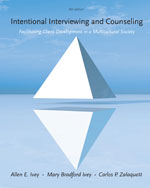 Intentional Interviewing and Counseling: Facilitating Client Development in a Multicultural Society, now in its eighth edition, is a textbook designed to teach students the basic skills of counseling and psychotherapy. The authors have updated this most recent edition to include innovative material on empathy, self-actualization, intentionality, resilience, crisis-counseling, self-disclosure, neuroscience, stress management and therapeutic lifestyle changes. Ivey, Ivey and Zalaquett (2014) authored Intentional Interviewing and Counseling with the goal of preparing students “for culturally intentional and flexible counseling and psychotherapy” (p. xvi). They do this by presenting students with a microskills hierarchy that delineates the successive steps in interviewing and counseling. According to the authors, if a student counselor masters the microskills, he or she is able to “anticipate and predict how clients will respond to your [their] interventions” and “be able to shift to skills and strategies that match their needs” (p. 10). Thus, most chapters in Intentional Interviewing and Counseling emphasize the development and adaptation of specific counseling skills that have been shown to help clients develop.
Intentional Interviewing and Counseling: Facilitating Client Development in a Multicultural Society, now in its eighth edition, is a textbook designed to teach students the basic skills of counseling and psychotherapy. The authors have updated this most recent edition to include innovative material on empathy, self-actualization, intentionality, resilience, crisis-counseling, self-disclosure, neuroscience, stress management and therapeutic lifestyle changes. Ivey, Ivey and Zalaquett (2014) authored Intentional Interviewing and Counseling with the goal of preparing students “for culturally intentional and flexible counseling and psychotherapy” (p. xvi). They do this by presenting students with a microskills hierarchy that delineates the successive steps in interviewing and counseling. According to the authors, if a student counselor masters the microskills, he or she is able to “anticipate and predict how clients will respond to your [their] interventions” and “be able to shift to skills and strategies that match their needs” (p. 10). Thus, most chapters in Intentional Interviewing and Counseling emphasize the development and adaptation of specific counseling skills that have been shown to help clients develop.
The textbook contains 16 chapters and about 460 pages, including the 3 appendices but excluding the references and indices. The book is divided into the following five sections: (a) the foundations of counseling and psychotherapy, which describes the microskills approach, ethics, multicultural competence, wellness, attending behavior and observation skills; (b) the basic listening sequence (e.g., questioning, reflecting feeling, active listening); (c) empathic confrontation; (d) interpersonal influencing skills (e.g., self-disclosure, reflecting meaning, and stress management); and (e) skill integration (e.g., treatment planning, relapse prevention). I found the text to be easy to read, and oftentimes chapters include transcripts or diagrams that facilitate a deeper understanding of the material.
The use of transcripts and example counseling sessions is a definite strength of the text. Students are able to read through sessions and reflect on the process comments provided by the author. For example, the appendix includes a transcript of a cognitive behavioral session that helps students to recognize how the microskills integrate with this theoretical orientation. The inclusion of neuroscience is also an interesting feature of the book. The authors often connect core counseling skills such as empathy with neuroscientific research in order to help readers recognize the biological basis of the skills. Lastly, throughout the text the authors note the role of culture and cultural competence in counseling, which could help instructors more easily integrate multiculturalism into their classroom discussions. One element the book seems to lack is a comprehensive emphasis on the role of the therapeutic relationship and working alliance. The relationship is arguably the cornerstone of any counseling approach and has numerous complex and important aspects. It would have been helpful to see this receive more emphasis in the text.
Overall, Intentional Interviewing and Counseling: Facilitating Client Development in a Multicultural Society provides a thorough overview of the basic counseling skills found in the microskills approach. The text is easy to read and has many beneficial features such as discussions of neuroscience, a multicultural perspective, and transcripts of example counseling sessions. Moreover, the instructor’s edition reportedly comes with several ancillary materials including a resource guide and an online test bank. Thus, this text could be a useful resource for anyone teaching a counseling skills course.
Reviewed by: Daniel Gutierrez, NCC, University of North Carolina at Charlotte, Charlotte, NC.
Ivey, A. E., Ivey, M. B., & Zalaquett, C. P. (2014). Intentional interviewing and counseling: Facilitating client development in a multicultural society (8th ed.). Belmont, CA: Cengage Learning.
The Professional Counselor
